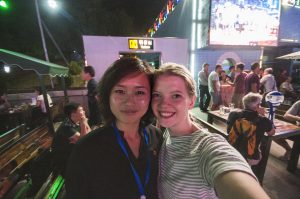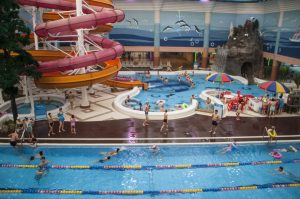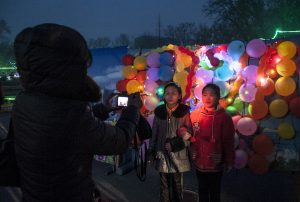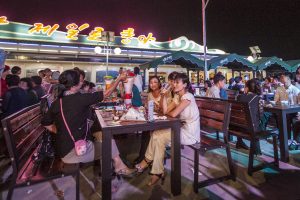Linda Hjelle, 24, has travelled with Young Pioneer Tours to North Korea on two occasions. Linda, originally from Norway, is currently studying for a masters degree in Chinese Society and Politics at Zhejiang University in Hangzhou, China.
Here, she speaks about her experiences travelling to the DPRK with YPT.
My first trip to North Korea was in September 2016, for YPT’s Grand National Day Ultra Budget tour. In the world we hear so many thing about North Korea in the media, but most of it is designed to either make fun of the country or to frighten us. I felt that it couldn’t be that black-and-white, so I decided to travel there myself to form my own opinion.
 Even before my tour was over, I knew that I had to come back for a longer tour. As soon as I was able, I booked a second trip… this time a full six day long tour over New Years. What I have experienced on these two trips has been a real eye-opener for me, and has made me break down prejudices I previously had about North Korea.
Even before my tour was over, I knew that I had to come back for a longer tour. As soon as I was able, I booked a second trip… this time a full six day long tour over New Years. What I have experienced on these two trips has been a real eye-opener for me, and has made me break down prejudices I previously had about North Korea.
Though it may seem strange for some, my main reason for going a second time was the friendships and connections I made with my North Korean guides and the local people I met and talked to. During the four months that passed in between my tours, I thought about them frequently, and in the globalized world we live in today it is difficult to make friendships with people whom we cannot easily contact. In the same regard, what surprised me the most on my first trip was how open and genuine the people are. We talked about everything: our taste in music and movies, our boyfriends or love interests, current events around the world, and future hopes and dreams. My lead guide and I would walk arm in arm down the streets of Pyongyang, taking selfies together and singing our favorite songs (you will be surprised how many foreign songs they know). The feeling of friendship we shared between us was warm and sincere.
 To add some more detail, I’d like to share an example of one of these nice moments. We made a visit to the Munsu Water Park, and it was packed with local people having fun in the water, daring each other to go down the slides, couples flirting and snuggling up to each other in the corners of the pool, parents goofing around with their children. This is not the North Korea we are taught to pictures; it was so normal, and so nice to be part of it. I started talking with three young girls in one of the pools. They were quite giggly and it seemed they were really fascinated about talking to a foreigner, so they followed me around in the pool for a bit, laughing and joking with each other. They wanted to talk to me, but because of the language barrier we couldn’t exchange much more beyond our names, age, nationality and so on. One of the girls kept pointing at me saying the word “chingu,” which means ‘friend’ in Korean. I believe it was a special experience for all of us, and that we were equally curious about each other.
To add some more detail, I’d like to share an example of one of these nice moments. We made a visit to the Munsu Water Park, and it was packed with local people having fun in the water, daring each other to go down the slides, couples flirting and snuggling up to each other in the corners of the pool, parents goofing around with their children. This is not the North Korea we are taught to pictures; it was so normal, and so nice to be part of it. I started talking with three young girls in one of the pools. They were quite giggly and it seemed they were really fascinated about talking to a foreigner, so they followed me around in the pool for a bit, laughing and joking with each other. They wanted to talk to me, but because of the language barrier we couldn’t exchange much more beyond our names, age, nationality and so on. One of the girls kept pointing at me saying the word “chingu,” which means ‘friend’ in Korean. I believe it was a special experience for all of us, and that we were equally curious about each other.
If you ask me, it’s those small moments and interactions that are the most giving and memorable while travelling in North Korea, and also what made me want to return after my first trip. On my last night in Pyongyang the second time around, myself and a few others stayed up until 6am in the hotel bar talking with a local man. It was a conversation I will never forget, and an interaction I never thought I would have with a North Korean inside the country. He was so open and knowledgeable, and shared with us his own personal opinions and experiences when it came to a wide range of topics, including differences and similarities between the North and South, regional and domestic politics, as well as prospects for unification. He kept saying that “Korea is Korea, people are people,” a statement that is difficult to disagree with once you’ve been to the DPRK or, for that matter, have much travelling experience at all. It is so important to differentiate between a country and its people.
 Most people in the DPRK are just like you and me. They play Candy Crush and Tetris on their phones, they go on family outings and barbeque together in the parks on holidays, they drink beer with friends in the afternoon. North Koreans go about their daily lives, they share sorrows and happy moments with their loved ones, and most people are not interested in getting involved in politics. Most people want stability. But they are curious, and they want the best for themselves and their family.
Most people in the DPRK are just like you and me. They play Candy Crush and Tetris on their phones, they go on family outings and barbeque together in the parks on holidays, they drink beer with friends in the afternoon. North Koreans go about their daily lives, they share sorrows and happy moments with their loved ones, and most people are not interested in getting involved in politics. Most people want stability. But they are curious, and they want the best for themselves and their family.
Some people also think that what foreigners see in the DPRK is all staged, a facade, a mere Potemkin Village. While it is true that what is presented to tourists is often the best of the country, this idea is a bit ridiculous when you actually experience a trip for yourself. We are not part of a “Truman Show” while in North Korea, it is simply not possible. First, because of the number of tourists that now visit the country. Second, because of the spontaneity and realness of people’s behavior wherever you go. Three million people living their lives in Pyongyang, commuting to their jobs, or spending time with their family, cannot possibly be actors, called on to be at a certain place at a certain time. Some people are shy toward foreigners, others keep staring at you, others again smile and wave or even try to exchange a few words. Some even come up and ask for a picture with you. Nevertheless, it is definitely safe to say that life in Pyongyang is more comfortable, and the living conditions of people here are surely not representative of the country as a whole. However, more and more cities and areas are opening up for tourists across the country, and as you travel on bus or train throughout the countryside, you get a glimpse of the lives of ‘ordinary’ North Koreans.
 Some of my friends and family have questioned why I would travel to North Korea. Based on my experience, I believe tourism is helping the country to open up more and more. When it comes to the regime, tourism can neither “break” it, nor “make” it, at least short term. But tourism is definitely part of a long-term solution, by helping to gradually influence the minds of Korean citizens about the outside world, as well as influencing those from the outside world in regards to their views on Korean citizens. Through increased exposure, increased flow of information, and through people-to-people interaction and exchange, new ideas will start to emerge and develop. By being present in the country, by showing the locals that foreigners are not bad, we can try to make a small but important difference. While we should care about the country’s situation, isolating and alienating its people is not the solution for change. We should not go there to judge, or to make fun of them, but instead to understand. And surely, to understand is not the same as to justify or accept.
Some of my friends and family have questioned why I would travel to North Korea. Based on my experience, I believe tourism is helping the country to open up more and more. When it comes to the regime, tourism can neither “break” it, nor “make” it, at least short term. But tourism is definitely part of a long-term solution, by helping to gradually influence the minds of Korean citizens about the outside world, as well as influencing those from the outside world in regards to their views on Korean citizens. Through increased exposure, increased flow of information, and through people-to-people interaction and exchange, new ideas will start to emerge and develop. By being present in the country, by showing the locals that foreigners are not bad, we can try to make a small but important difference. While we should care about the country’s situation, isolating and alienating its people is not the solution for change. We should not go there to judge, or to make fun of them, but instead to understand. And surely, to understand is not the same as to justify or accept.
Overall, travelling to North Korea has been a unique experience that has enriched my life and made me grow as a person. I have not been “brainwashed”. I am as critical as before, but I feel I have gained a broader perspective. Before my first trip to the DPRK, I imagined North Koreans as an indistinct mass of brainwashed people, without any room for personal expression or a mind of their own. Now, on the contrary, I know that that is not the case, and I see individuals with their own stories, lives, hopes and dreams. When you travel to the DPRK, you are not going to a zoo, you are going to a country with real human beings.
To anyone considering travelling to North Korea: Follow your gut feeling, and do what you think is right for you. I did, and it was an experience I will never forget.






